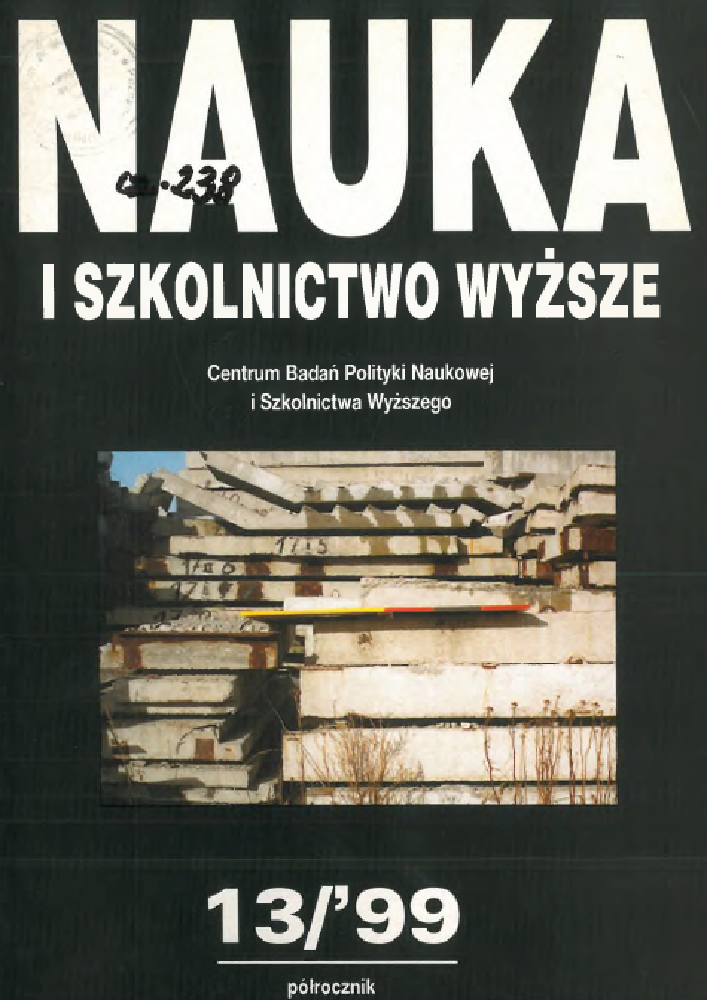Abstract
The subject of the article are bridge organisations (also alled buffer bodies, mediatory institutions) and their special form, so-called research councils, also called foundations, agencies, etc. The term bridge body is applied to formally constituted organisations situated between government institutions (e.g. the minister of higher education or minister of science) and organisations operating in a given sphere (e.g. colleges and universities or research organisations), which allocate government funds for basic and strategic research (i.e. means that are not channelled directly to universities) and which give a role to the research community in the allocation of funds. The author describes the characteristics of bridge bodies and research councils, the roles they perform and the differences between these institutions. Two basic theoretical approaches are discussed that elucidate the relations of research councils with the government on the one hand and with the academic community on the other (the research council as the parliament of science and the council as agent-principal). The final section of the paper discusses current tendencies of changes concerning the place and significance of research councils in the world and against the background of the role of the Committee for Scientific Research in Poland.
References
Becker T., Kogan M. 1990 Process and Structure in Higher Education, London, Heinemann Press.
Braun D. 1993 Who Governs Intermediary Agencies? Principal - Agent Relations in Research Policy Making, „Journal of Public Policy”, vol. 13, nr 2.
Clark B. 1983 The Higher Education System. Academic Organization in Cross National Perspective, University of California Press, Berkeley - Los Angeles - London.
El-Khawas E. 1993 Academic Buffer Organizations: Their Critical Role in a Democratic Society, w: Academic Freedom and University Autonomy, Papers on Higher Education, CEPES, UNESCO, Bucharest.
Fenger P .1992 Research Councils: Buffers under Cross Pressures, „Higher Education Management”, July, vol. 4, nr 2.
Guston D. 1996 Principal - Agent Theory and the Structure of Science Policy, „Science and Public Policy”, vol, 23, nr 4.
Jablecka J. 1995a The Changes of the Management and Financing ot the Research System in Poland, „Social Studies of Science”, nr 4, Special Issue.
Jablecka J. 1995b Procedury oceny projektów badawczych w wybranych agencjach, fundacjach i radach badawczych w Stanach Zjednoczonych i Wielkiej Brytanii, „Zagadnienia Naukoznawstwa”, nr 3-4.
Johnson R. 1990 Project Selection Methods: International Comparisons, Technology and Social Center, University of Wollongong, Prepared under contract to the Office of Technology Assessment, Congress of the United States, June.
Kogan M. 1992 Research Councils: Buffers under Cross Pressures. A Commentary on P. Fengers Article, „Higher Education Management”, July, vol. 4, nr 2.
Polanyi M. 1962 The Republic o f Science, Its Political and Economic Theory, "Minerva", vol. I, nr 1, Autumn.
Rip A. 1994 The Republic of Science in the 1990s, „Higher Education”, nr 28.
Rip A., Van der Meulen B.J.R. 1994 Research Institutes in Transition, Centre for Studies of Science, Technology and Society, University of Twente, Eburon Publishers.
Shattock M. 1989 Higher Education and Research Councils, "Minerva", vol. XXVII, nr 2-3.
Skoie H. 1996 Basic Research - a New Funding Climate, „Science and Public Policy”, vol. 23, nr 2.
